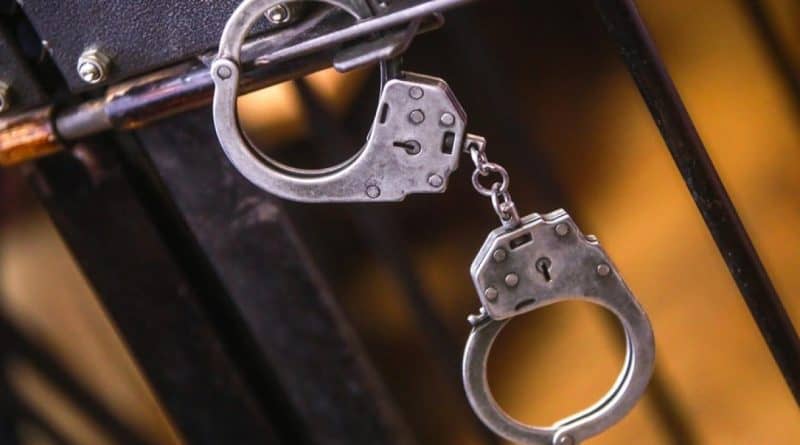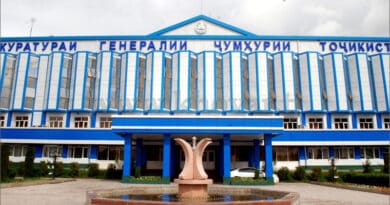In Kyrgyzstan, every fifth detainee complains of torture
In the Kyrgyz Republic in 2019, the index of violence and torture in cases of restriction and imprisonment decreased by 16.5 points compared to 2018. Nevertheless, the recorded level of torture and cruel treatment in places of detention remains high; at least every fifth detainee notes the use of unjustified physical force during detention. This is stated in the annual report of the Coalition against torture in Kyrgyzstan, published on the organization’s website.
The authors of the document note that the data allowing to calculate the index of the use of physical force, violence and psychological pressure in relation to persons held in the internal affairs structures, temporary detention facilities or pre-trial detention centers were collected for two years. In 2019, 743 people participated in the survey; in 2018, there were 679 people.
The results of comparing the indices of violence and torture with restriction and deprivation of liberty showed that the indices of violence in pre-trial detention centers did not improve as much as in the internal affairs structures or temporary detention facilities. The proportion of women (22% as against 46%, respectively) decreased by 2 times compared to 2018, indicating that they are subjected to physical violence and psychological pressure inside the internal affairs structures or temporary detention facilities.
But, as in 2018, young people under the age of 30 are more likely to report the use of unjustified force and violence during detention than representatives of older age groups. Human rights activists note that the proportion of minors has significantly increased, who noted that during their detention they were subjected to unjustified physical impact. In 2018, 23% of respondents complained about it, and in 2019 there were already 36%.
An important guarantee of the successful struggle of law enforcement agencies with torture, human rights defenders call an effective investigation into allegations and reports of torture. At the same time, the report says that the official statistics of the General Prosecutor’s office of the Kyrgyz Republic, as well as data for the same period of previous years, indicate serious problems in the investigation of torture.
For the first half of the year, the prosecution authorities registered 171 allegations of torture, of which 10 were from the previous year. Most of the appeals are complaints about the actions of employees of the internal affairs structures (127 statements), about the actions of the national security bodies (3 statements).
As part of the pre-trial proceedings, 19 criminal cases were terminated, only 1 case was sent to the court for the first half of 2019, and 151 criminal cases are under investigation.
The analysis of the materials of criminal cases showed that the initiation of a criminal case does not guarantee the rapidity of the investigation. Sometimes, initiated cases are terminated, but criminal cases under investigation are without significant progress in the collection of evidence.
“In the overwhelming majority of cases, employees of the national security bodies and the Prosecutor’s office violate such principles of independence of the investigation as an impartial attitude to the assessment of the collected evidence and adequate justification for decisions to terminate the criminal case on a complaint of torture,” the authors of the report write.
Namely:
– the investigators and the officials conducting the investigation concluded that the applicants’ complaints did not find objective confirmation, although, in the opinion of representatives of human rights organizations, they themselves did not take the necessary steps to verify the complaints;
– the investigators did not analyze and evaluate the injuries received by the applicants. There are facts of refusals to initiate criminal case, even in the presence of positive conclusions of the forensic medical examination;
– the investigators used a different approach to the assessment of evidence, relying on the testimonies of the police officers as true and rejecting the testimonies of the witnesses and the applicants themselves as false, indicating, in particular, that the testimonies of the applicants were motivated by their desire to evade responsibility for the committed crimes;
– the investigators made decisions in which the motivation was identical to the motivation of those decisions that had previously been canceled by the courts or higher authorities as insufficiently motivated.
In addition, the authors of the report draw attention to non-compliance with procedural guarantees during detention and imprisonment.
Last year, the Human Rights Advocacy Center (one of the organizations of the Coalition against torture) monitored court hearings to verify the legality and validity of the detention and the application of preventive measures. The study was conducted from May 15, 2019 to October 15, 2019 in the local courts of the Kyrgyz Republic with the support of the Supreme court and the OSCE Program Office in Bishkek as part of the project “Supremacy of law and the administration of justice”.
During the reporting period, 458 court hearings were monitored to verify the legality and validity of the detention and/or the application of preventive measures against suspected persons in 17 local courts of 7 regions of the Republic.
Human rights defenders concluded that the following facts, identified during this monitoring, are of greatest concern in terms of protection from torture and cruel treatment.
The right to stand trial immediately. After the detention, 3.5% of the suspects appeared before the court after 48 hours, 76.8% – before the end of 48 hours and 4.4% – immediately after the detention. In 2019, there was a dynamics of decrease in some cases of violation of 48-hour period from the moment of detention and delivery of suspects to the court. Practice shows that torture and cruel treatment take place immediately after detention.
Consideration of the order of detention by investigating judges of local courts. The detention of a person on suspicion of committing a crime or applying a preventive measure until a charge is brought does not relieve the inquiry officer from the obligation to notify the detainee of suspicion of a crime. By the time the notice of suspicion of committing a crime is compiled, all legally relevant circumstances necessary to describe the crime must be proved, indicating the place, time of its commission, as well as other circumstances. During the court hearings to verify the legality and validity of the detention and the application of the preventive measure by the investigating judges in each 3rd case, it was not found out whether the suspect was charged at the time of the actual detention and whether they asked for his consent with the suspicions. In every 2nd case, the investigating judges did not specify the time for the preparation and delivery of the detention protocol to the suspect.
Respect for procedural rights during detention. During the monitoring, it was found that 38.3% realized their right to one productive call; the right to keep silent and not to incriminate themselves was voiced to 44.9% of the suspects; 45.7% of the suspects were aware of their right to defense.
Grounds for the detention of suspected persons. It is of serious concern that in some cases prosecutors do not provide any grounds for detaining a suspected person (4.4%), or are based only on eyewitness evidence, including victims (39.3%). And only in 8.6% of cases, there were materials obtained in accordance with the law for operational-search activities against suspected persons.
The use of preventive measures. Out of 458 court hearings, 377 prosecutors requested the use of preventive measures related to deprivation of liberty. According to observers, in 73.7% of cases, the evidence presented by the prosecution to the grounds for applying a preventive measure was more subjectively presumptive, when they referred to the risk that the person would hide, obstruct justice, repeat the crime, without concrete reasons why this could happen.
Presumption of innocence. 355 out of 458 suspects (77.5%), brought to court to verify the law, validity and application of preventive measures, were handcuffed. Both suspected men – 338 cases (73.8%) and women – 17 cases (3.7%) were delivered in handcuffs. Without handcuffs, but accompanied by an armed convoy, there were 58 (20.5%) of the suspects who had previously been detained.
The right to defense. Of the 458 detainees, 457 or (99.8%) were provided with legal defense. At the same time, 27 suspects (accused), or 5.9%, said that before the start of the trial they had never seen their lawyers.
Among them were 16 suspects, who were brought to court before 45 hours from the moment of detention, and 5 suspects/accused, who were brought to court immediately after the arrest. This can only testify to the fact that there was no de facto lawyer during the detention or during the first interrogation. Also 7.2% of suspects said that during the interrogations the participation of lawyers was not ensured; 22.1% of the suspects said that there was a lawyer during interrogations, but until the very interrogation, the suspects never met with these lawyers and had no communications. Human rights defenders believe that these cases had high risk of using torture and cruel treatment.
“The recommendations of civil society organizations aimed at providing guarantees of protection against torture and cruel treatment in places of deprivation restriction of liberty and improving the conditions of their detention, including timely and high-quality medical care, are addressed to state bodies from year to year. However, the government of the Kyrgyz Republic and authorized state bodies do not take proper measures to implement them, and individual taken measures do not have the proper effect to eliminate the identified system violations,” the authors of the report conclude.
The Coalition against torture believes that in order to change the current situation, it is necessary to do the analysis of all the recommendations of national human rights institutions, civil society organizations aimed at preventing and combating torture, cruel treatment for 2016-2019 and the development of an Action Plan for their implementation with the establishment of deadlines and state bodies, who are responsible for the execution.




